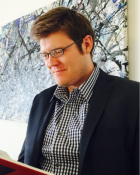
Corina McIntyre

Jordan WALLACE-WOLF
Corina McIntyre ’12 is a corporate associate at Debevoise & Plimpton. Jordan is pursuing the joint JD/PhD in our Law and Philosophy Program. He has completed the JD and is currently writing a dissertation on privacy.
JW: Can you describe your current position?
CM: I’m a corporate associate in the New York office of the law firm Debevoise & Plimpton. I’m in my first year, which means I’m in my first set of rotations in the corporate department. I am working in the Corporate Intellectual Property group. Next year it’s unknown where I would rotate. It would be another department in the corporate group, something complementary to what I’m doing now, mergers and acquisitions, or private equity, or capital markets. This category of firm is referred to as Big Law. We have an offices in New York, Washington, DC, and then a number of other offices internationally. We’re a very New York-centric firm, we’ve got over a thousand people that support just the New York operation alone.
JW: Tell me about what comes your way in the current rotation that you're in, Corporate Intellectual Property. What sort of cases do you see, or what sort of clients do you have?
CM: 85% of the work that I do is mergers and acquisitions, M&A. Our firm represents a lot of private equity clients that are purchasing companies in all kinds of industries. That could be software. That could be manufacturing. It could be insurance, healthcare. In my current rotation when I work on M&A transactions, almost always I’m working on the intellectual property, information technology, cybersecurity and data privacy aspects of that transaction.
JW: Tell me a little bit how you got interested in intellectual property. I think many people see it as kind of a niche legal area.
CM: Many people say, “You can only do IP if you were an engineer or could be patent bar eligible.” That’s wrong. I actually learned when I did my summer associate position here at this firm, at Debevoise, that it would be possible for me to practice IP even though I didn’t have an engineering or science background. For anybody that is interested in intellectual property, you don’t need to write that off as an option just because you don’t have that engineering or hard sciences degree.
JW: I want to ask you about philosophy as it plays a role in your career. How do you think the skills of philosophy, or the training that you got there, applied to your job?
CM: One of the ways that on a daily basis the philosophy degree helps me is the attention to detail that you get. It comes up on the job. In reviewing and drafting contracts, it is seemingly small things that really matter. They’ll be seemingly small things to the non-corporate lawyer that is. Philosophy students and philosophy graduates have this mental willingness to explore all kinds of possibilities.
JW: Where did you put your energy as an undergraduate? And also, what advice would you give undergraduates about how to get the most out of their undergraduate studies?
CM: I was a transfer student, so I only got to do my junior and senior years at UCLA. I’d also taken time off after high school, so I wasn’t even straight through, I was now kind of nearing my mid-20s. By that point, I’d already gone through the back and forth in terms of figuring out what I wanted to do for next steps and a career path. There was absolutely no question that I was going to law school.
I did the Astin Fellows Civic Engagement program at UCLA, I did JusticeCorps, I was heavily involved in UCLA Pre-Law Society, as well. They were beneficial to my law school applications, but I enjoyed those experiences so much. They were so valuable to me in terms of finding meaning outside of being in the classroom. The advice that I would give to current students is that you already are going to be spending so much time in the classroom and in the books, make sure that that is not all you do while you are at UCLA.



